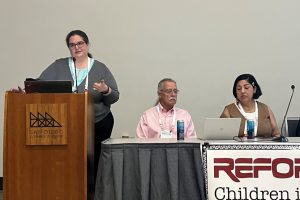
“My twin sister and I were the only Muslims in our school,” said author Sarah Mughal Rana.
“My daughter was told that you can’t be Black and Muslim at the same time,” said author Khadijah VanBrakle.
“I come from an Iraqi Shia background,” said author Huda Al-Marashi. “Even in a nonfiction textbook, the only definition of us was as the radical group of Muslims.”
Muslims are one of the most racially diverse religious groups in the US, but their stories are often underrepresented, misrepresented, censored, or silenced. A multiethnic panel of Muslim authors and educators gathered Sunday, June 30, at the American Library Association 2024 Annual Conference and Exhibition in San Diego for “Multitudes: The Power of Authentic & Diverse Representation in Muslim Stories,” moderated by Helaire Hamilton Mitchell, youth services librarian at Redondo Beach (Ca.) Public Library.
Many of the authors in attendance said that their reason for writing was to create the works they wished they’d had as children or for their own children. “We’re responding in one of two ways,” said Al-Mirashi, co-author of Grounded (Harry N. Abrams, 2023). “Either we’re writing directly to [current] events and the way they’re impacting us, or we are trying to reclaim and assert our right to joy and to write in ways where our characters are allowed to just happen to be Muslim.”
Author Rhonda Roumani feels as though she’s been asked to explain things about other global Muslims since childhood, including the fatwa against Salman Rushdie, 9/11, the Iraq war, and now the war in Gaza. In recent months, she and her friends have had author talks canceled. Her book Tagging Freedom (Union Square Kids, 2023) explains the origins of the current civil war in Syria and centers on protest and revolution. “As authors, many of our organizations have not stood up for us the way they have for Ukraine and other topics and other groups in the past,” she noted, adding that less than 1% of kid lit contains Arab representation or is by an Arab author. “When there is conflict, the easiest thing to do is to silence the weakest group in the room.”
However, “no one has canceled any of my talks about this happy little Chinese girl in a Chinese dance costume,” said Diana Ma, author of The Unbeatable Lily Hong (Clarion Books, 2024), whose main character, like Ma, is a member of the Chinese Muslim group known as the Hui. “There are some books that are being censored before they are published,” she said. “There are a lot of books that we’re not getting because of current events.”
There’s much that librarians can do to support the Muslim community and diversify their collections and personal knowledge. Don’t limit Muslim stories to “diversity” units, suggested M.O. Yuksel, author of One Wish (HarperCollins, 2022), a picture book about Fatima Al-Fihri, the woman who founded the world’s oldest university, which is still operating in Fez, Morocco. Including Muslim women in Women’s History Month observations, for example. is particularly important to counter harmful stereotypes.
“As Muslims, we don’t all speak the same language or share the same culture or even eat the same foods,” said Yuksel. “We’re required to be global citizens because what we don’t understand, we fear, and what we fear turns into online bullying and harassment and other dehumanizing acts.”
VanBrakle recalled being asked, “Is your book for Muslim teenagers?” “No,” she replied. “My book is about a Muslim teenager. … It’s for all teenagers.” She’s found librarians who’ve included her book Fatima Tate Takes the Cake (Holiday House, 2023) in reading lists and programs about baking and the holidays—and thanked each one. “Of course, I have to start with ‘Thank you’ because they think I’m calling to complain about the list!”
Mughal Rana spoke about how her mother used food to connect with her local, majority-white community soon after 9/11, at a time when sentiment about Pakistani people was particularly charged in the US. Food helped humanize her family, a theme she wove into her book, Hope Ablaze (Wednesday Books, 2024). “I love reading books when I’m hungry because it inspires me,” she said. “And I’ve had many readers be like, ‘Oh my god, I had to Google the nearest Pakistani restaurant and order that even though it’s like two hours away.’ Good! Support them!”
“As a mother, all I want for my children is for them to see themselves in a joyful way,” said author Natasha Khan Kazi. “My kid, like every kid, is obsessed with Santa Claus and Christmas. And I wanted him to be excited about our own heritage and culture.” When her five-year-old said “I need a better book” about why we celebrate Ramadan, she took it upon herself to create that book, which became Moon’s Ramadan (Versify, 2023).
“I never want a kid to come in and and not feel like they have a place,” says Hamilton Mitchell. “These books help make sure that I’m able to make a place for these kids that come into my library and show them that I may not understand everything you’re going through or know all of your background. But I do try to learn, and here’s the place where you can even learn more about yourself and your culture.”
The panelists provided a list of recently published Muslim children’s and young adult books.


